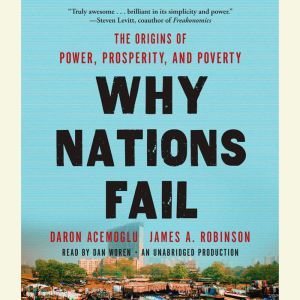

Why Nations Fail
The Origins of Power, Prosperity, and Poverty
Author: Daron Acemoglu, James A. Robinson
Narrator: Dan Woren
Unabridged: 17 hr 55 min
Format: Digital Audiobook Download
Publisher: Random House Audio
Published: 03/20/2012
Categories: Nonfiction, Business & Economics, Political Science, Public Policy
Includes:
Bonus Material
![]()
Synopsis
“A wildly ambitious work that hopscotches through history and around the world to answer the very big question of why some countries get rich and others don’t.”—The New York Times
FINALIST: Financial Times and Goldman Sachs Business Book of the Year Award • ONE OF THE BEST BOOKS OF THE YEAR: The Washington Post, Financial Times, The Economist, BusinessWeek, Bloomberg, The Christian Science Monitor, The Plain Dealer
Why are some nations rich and others poor, divided by wealth and poverty, health and sickness, food and famine? Is it culture, the weather, or geography that determines prosperity or poverty? As Why Nations Failshows, none of these factors is either definitive or destiny.
Drawing on fifteen years of original research, Daron Acemoglu and James Robinson conclusively show that it is our man-made political and economic institutions that underlie economic success (or the lack of it). Korea, to take just one example, is a remarkably homogenous nation, yet the people of North Korea are among the poorest on earth while their brothers and sisters in South Korea are among the richest. The differences between the Koreas is due to the politics that created those two different institutional trajectories. Acemoglu and Robinson marshal extraordinary historical evidence from the Roman Empire, the Mayan city-states, the Soviet Union, the United States, and Africa to build a new theory of political economy with great relevance for the big questions of today, among them:
• Will China’s economy continue to grow at such a high speed and ultimately overwhelm the West?
• Are America’s best days behind it? Are we creating a vicious cycle that enriches and empowers a small minority?
*Includes a downloadable PDF of maps from the book
“This book will change the way people think about the wealth and poverty of nations . . . as ambitious as Jared Diamond’s Guns, Germs, and Steel.”—BusinessWeek


